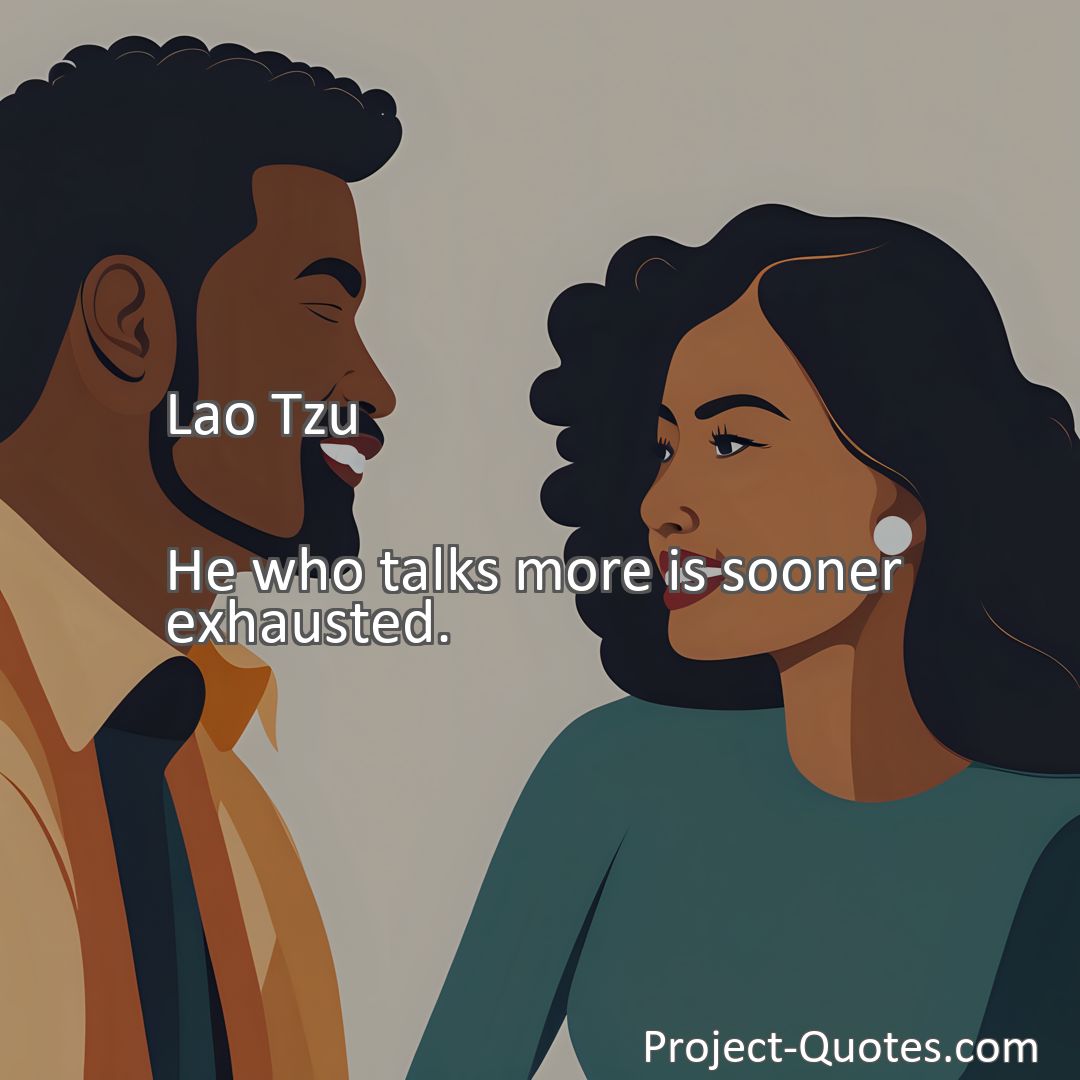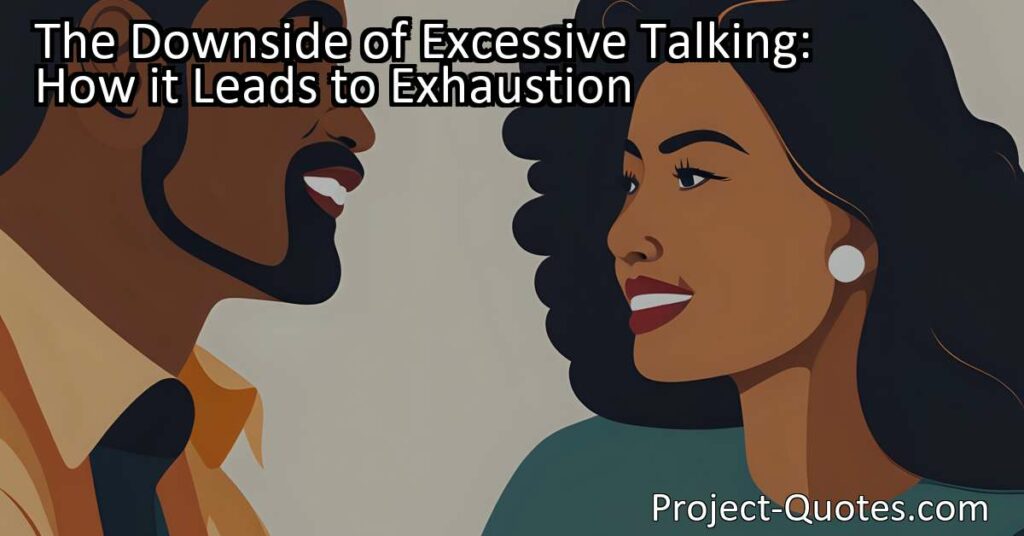He who talks more is sooner exhausted.
Lao Tzu
The Downside of Excessive Talking: How it Leads to Exhaustion Excessive talking can lead to exhaustion because it prevents others from participating in the conversation and limits the speaker’s ability to listen and learn. It can also contribute to increased stress levels and hinder personal growth. Finding a balance between talking and listening, being mindful of our conversational habits, and embracing moments of silence can help prevent exhaustion and create more meaningful connections. Remember, “He who talks more is sooner exhausted.”
Table of Contents
Meaning of Quote – He who talks more is sooner exhausted.
Have you ever noticed that some people just can’t seem to stop talking? They always have something to say, whether it’s a story, a joke, or just their opinion on the latest news. It’s as if they have an endless supply of words and can go on talking for hours without taking a breath. But have you ever wondered if there might be a downside to this constant chatter? Well, as the famous quote goes, “He who talks more is sooner exhausted.”
At first glance, this quote may seem counterintuitive. After all, talking is just using our voices to express ourselves, right? How could it possibly tire us out? To understand this, we need to dig a little deeper and explore the intricacies of communication.
Communication is a two-way street. It involves expressing ourselves, but it also requires listening to others. When someone talks excessively, they tend to dominate the conversation, leaving little room for anyone else to speak. This not only shows a lack of consideration for others but also prevents the speaker from truly engaging with new ideas and perspectives.
Think about a time when you were excited to share something with a friend, only to have them interrupt you and steal the spotlight. How did that make you feel? Probably not great. This is because communication is not just about getting our own ideas across; it’s about building connections, showing empathy, and valuing the thoughts and feelings of others.
Another important aspect of communication is active listening. When someone talks non-stop, they leave little room for others to contribute their own thoughts and ideas. This can lead to frustration and even resentment among those who feel sidelined or unheard. Healthy conversation requires a balance of speaking and listening, allowing everyone involved to feel valued and respected.
Moreover, excessive talking can be mentally and physically exhausting. Have you ever had a day where you had to give a presentation or participate in a group discussion for an extended period? By the end of it, you may have felt drained, your voice tired, and your mind craving some peace and quiet. This is because talking requires energy, concentration, and focus. When we speak too much, our mental and physical resources become depleted, leaving us feeling exhausted and unable to perform at our best.
Furthermore, the quote suggests that those who talk more are sooner exhausted. This implies that there may be a connection between excessive talking and burnout. Burnout is a state of chronic exhaustion, both mentally and physically, caused by prolonged stress or excessive workload. While talking excessively may not directly lead to burnout, it can contribute to overall stress levels. Constantly voicing your thoughts, trying to keep the conversation going, or feeling the need to fill every moment with words can put significant pressure on a person, leading to increased stress levels and, eventually, exhaustion.
But let’s not get the wrong idea here; talking is not inherently bad. It’s an essential part of human interaction, allowing us to connect, share information, and build relationships. However, like many things in life, moderation is key. It’s important to find a healthy balance between talking and listening, giving everyone an opportunity to participate in the conversation.
Besides, excessive talking can hinder personal growth and learning. When we talk too much, we limit our ability to absorb new information, consider alternative viewpoints, and expand our knowledge. It’s like having a full glass of water there’s no room for anything else. By taking the time to listen to others, we open ourselves up to new ideas, different perspectives, and valuable insights. This not only enhances our understanding of the world but also enriches our own experiences and personal growth.
So, how can we prevent ourselves from falling into the trap of excessive talking? Firstly, it’s essential to be mindful of our own conversational habits. Are we dominating the conversation? Are we giving others a chance to speak? By being aware of our behavior, we can make a conscious effort to be more balanced and inclusive in our interactions.
Secondly, practicing active listening is key. Instead of constantly thinking about what we’re going to say next, we should focus on truly understanding and empathizing with the speaker. This means giving our undivided attention, maintaining eye contact, and responding in a thoughtful manner. By actively listening, we show respect for others and create a more meaningful and engaging dialogue.
Lastly, taking breaks and allowing for moments of silence can help us recharge and preserve our mental and physical energy. We don’t always have to fill the silence with words; sometimes, silence can be just as powerful and meaningful. By embracing moments of quiet reflection, we give our minds and bodies a chance to rest and rejuvenate.
In conclusion, as the quote suggests, excessive talking can lead to exhaustion. Balancing speaking and listening is not only crucial for effective communication but also for maintaining our mental and physical well-being. By being mindful of our conversational habits, actively listening, and embracing moments of silence, we can create more meaningful connections, engage in deeper learning, and preserve our energy for what truly matters. So, let’s remember the words of wisdom: “He who talks more is sooner exhausted.”
I hope this quote inspired image brings you hope and peace. Share it with someone who needs it today!


